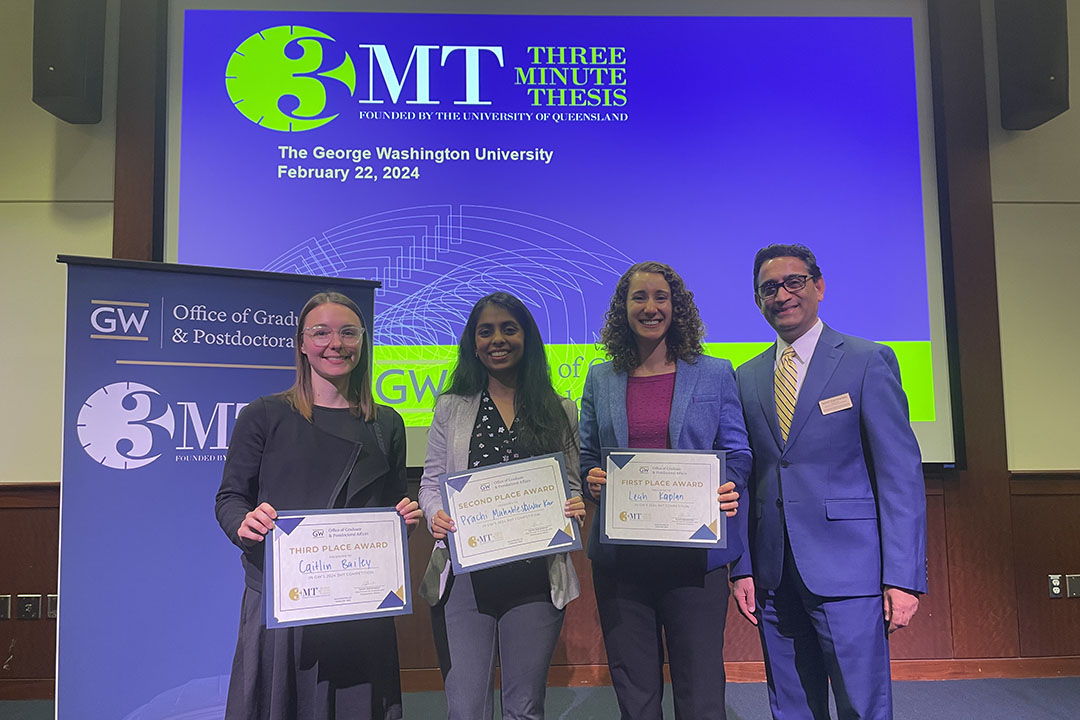A 100-page dissertation could take hours to present. Can you do it in three minutes? This question was first posed to GW Engineering Ph.D. candidates in 2022 at GW’s annual Three Minute Thesis (3MT) competition. At the 2024 3MT competition, 24 students from across all of GW’s doctoral programs, including six from GW Engineering, took on this challenging task on February 22. GW Engineering is excited to announce Systems Engineering Ph.D. candidate Leah Kaplan took home first place for her project, “AI Behind the Wheel: Work, Economics, and Preferences in the Era of Autonomous Vehicles!”
The 3MT contest, first launched in 2008 by the University of Queensland, is now held in over 600 academic institutions across more than 65 countries worldwide. The Columbian College of Arts & Sciences brought the contest to GW in 2019. This year marked the first time students from all GW schools were eligible to participate.
“I chose to enter because I feel very strongly that being able to communicate your results is an important part of being a researcher,” said Kaplan. “Your research will only have so much impact if you are unable to explain it.”
As the winner of the 3MT competition, Kaplan received $1,000 in prize money and will have the opportunity to compete in the Northeastern Association of Graduate Schools’ regional tournament later this spring. Regarding this opportunity, Kaplan stated, “It was exciting to learn more about the research happening across GW, so I’m interested to see what stood out across the country.”
Kaplan’s research explores the societal impact of autonomous vehicles (AVs), just one example of emerging artificial intelligence (AI) technologies that present both significant benefits and risks. Her dissertation is split into three different studies to further understand the implications of substituting a human for AI technology. She interviewed workers in driverless taxi companies and discovered that rather than eliminating human labor, automation often transforms it. Using those interviews and information from existing taxi services, Kaplan created an operating budget to see how automation affects costs in her second study.
In Kaplan’s final study, she conducted a survey to examine the potential competition between AVs and public transit, finding that respondents were most willing to pay for automated modes when there was an “AV attendant” onboard. This piece of her dissertation fills an important gap in research on public preferences for AVs. Ultimately, her research ties to questions around trust in AI systems and how to design emerging AI technologies, which many researchers are now addressing as well, making her hopeful for the future of AVs.
“This research adds to a body of research that is raising important questions. I am hopeful that people are thinking critically about this technology that has both potential benefits and harm. Recognizing harms early on gives space to recognize and attempt to mitigate those harms earlier on in the design process,” said Kaplan.
At GW, we recognize that AI systems must be developed and deployed with sensitivity to implementation, governance, equity, and social impact. Kaplan says this organizational culture and GW Engineering’s “engineering and…” ethos made GW Engineering a great environment for researching the societal impacts of AVs, particularly within the Department of Engineering Management and Systems Engineering (EMSE).
Kaplan has been able to take part in programs around trustworthy AI that have come about since joining GW Engineering, such as being a fellow with GW’s Co-Design of Trustworthy AI Systems (DTAIS) program and an affiliate with the Institute for Trustworthy AI in Law & Society (TRAILS), which she says greatly informed her research. Throughout her Ph.D. journey, EMSE assistant professor John Helveston served as her advisor and provided invaluable guidance and support as well.
“I’m grateful to have had the privilege of working with Leah as her advisor. Leah is not only a fantastic scholar but also an engaging speaker. She is deeply passionate about her research, and you can see that come through whenever she gets a chance to present it to others,” Helveston said. “Being able to condense and translate complex research findings for a broad audience is also something I emphasize with all students in my lab, so the 3MT competition was a wonderful opportunity to practice that skill.”
Other participants from GW Engineering included: Alex Horowitz (mechanical and aerospace engineering); Emad Mashayekh (water resource engineering); Ibrahim Yildiran (mechanical and aerospace engineering); Anmol Taploo (mechanical and aerospace engineering); and Sara Youssoufi (mechanical and aerospace engineering). Department chair and professor of biomedical engineering Vesna Zderic also served on the panels of judges.


